On business and management books by Vaynerchuk, Taleb, Rosling, et al
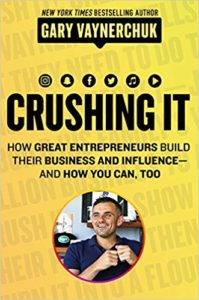 Reading business and management books can be an interesting experience. Usually an entire book of approximately 300 pages has a single idea to discuss and will do so with innumerable examples and if required, experiments too. In an age when self-help and business books are inevitable bestsellers, then books by management gurus are definitely going to sell. It is a worldwide phenomenon. Surprisingly many of the books that are published inevitably trot out loads of common sense. It is as if reminding entrepreneurs and management professionals, don’t forget the basics of human engagement. Mantras like communication is essential, team work, data collection and analysis, pay heed to specialists but never forget to do your own homework, be responsible for your actions, push your limits, encourage your teams and always be a team player, exercise any leadership qualities you may have, learn from your mistakes,
Reading business and management books can be an interesting experience. Usually an entire book of approximately 300 pages has a single idea to discuss and will do so with innumerable examples and if required, experiments too. In an age when self-help and business books are inevitable bestsellers, then books by management gurus are definitely going to sell. It is a worldwide phenomenon. Surprisingly many of the books that are published inevitably trot out loads of common sense. It is as if reminding entrepreneurs and management professionals, don’t forget the basics of human engagement. Mantras like communication is essential, team work, data collection and analysis, pay heed to specialists but never forget to do your own homework, be responsible for your actions, push your limits, encourage your teams and always be a team player, exercise any leadership qualities you may have, learn from your mistakes,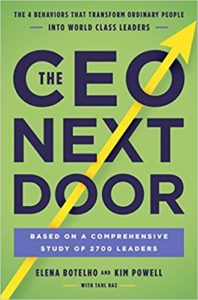 seek advice from professionals/specialists if need be, always look for empirical evidence, take risks but always be responsible for the consequences, do not be disheartened when mistakes occur — learn from them, create enduring legacies but always remember to evolve. Always seek facts, take deep dives and research your sector thoroughly before making critical decisions. Do not be in haste but do not overthink your decisions either as that too can be counterproductive. Micro-speed in today’s world is crucial but the macro-picture is equally essential. Finally, the bottom line is always important. Yet there is no harm to dabble in some experimentation and
seek advice from professionals/specialists if need be, always look for empirical evidence, take risks but always be responsible for the consequences, do not be disheartened when mistakes occur — learn from them, create enduring legacies but always remember to evolve. Always seek facts, take deep dives and research your sector thoroughly before making critical decisions. Do not be in haste but do not overthink your decisions either as that too can be counterproductive. Micro-speed in today’s world is crucial but the macro-picture is equally essential. Finally, the bottom line is always important. Yet there is no harm to dabble in some experimentation and 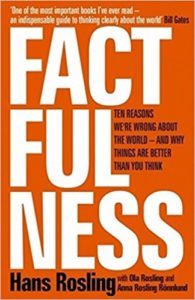 prepare for the future.
prepare for the future.
All the books discussed in some way or the other dwell on these important aspects of business management. This kind of advice can never get old and will always remain relevant. All that might change are the modes of communication and product diversification to match the changing expectations of clients/customers. Business climates may alter a bit and so will the economic policies across nations but the fact remains is that those who want to remain in the business will always be mentally agile, quick-witted, sure-footed, team players and always swift. Many anecdotes touching upon these aspects are shared in CEO Next Door is based on an in-depth analysis of over 2,600 leaders drawn from a database of more than 17,000 CEOs and C-suite executives, as well 13,000 hours of interviews, and the two decades of experience advising CEOs and executive boards that Elena Botelno and Kim Powell have between them. Based upon this data they identified four essential behaviours that define CEOs — be decisive, reliable, adapt 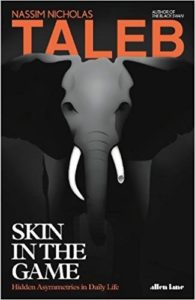 and engage with stakeholders and not shy away from conflict.
and engage with stakeholders and not shy away from conflict.
Even though most of these books were fascinating to read with plenty to learn from, I could not help but think that at least two of the titles mentioned — Skin in the Game and Factfulness — were a little baffling. Great ideas. Fantastic premises for discussing their ideas. Taleb’s fascinating and equally logical principle that everyone should be fully responsible for the consequences of their action i.e. have their “skin in the game”. Factfulness again is goading its readers to not be wrong and miserable about the world as it is today. The Roslings list at least ten factors that come into play when an individual analyses the world and most of these are born out of ignorance and lack of knowing one’s true facts. Whereas it is always essential to remember that facts exist and should be paid heed to. In fact they will brighten one’s outlook of the world. Even though both the books are based on fine principles the fact is they do not necessarily seem to take into account that many readers who will turn to these books will do so with some hope to gain nuggets of wisdom from their business gurus. Many of these people may or may not have steady jobs as it is the gig economy which is dominant. In that case many won’t have the mental peace and security to think twice about their actions or even stop to analyse too many of the facts swirling around them. More and more people are keen to get the job at hand done so as to earn some income.
This is an aspect that Gary Vaynerchuk is very clear about. He often reiterates it in his podcasts, videos and books. Ensure you have some form of steady income coming in to experiment with your ideas. He never discourages anyone but asks them to face the hard truth before taking the plunge in a start up or changing business tactics. Financial  security always brings with it some sort of internal peace and a sense of well-being to an individual before they can consider taking another step in professional growth whether personally or for their business interests. Interestingly Alex Hutchinson’s discovery from his passion for athletics is that the body is able to endure a fantastic amount of physiological stress and can invest in itself to push known limits but in order to do so there has to be mental peace. For him the truth is that “the brain and the body are fundamentally intertwined.”
security always brings with it some sort of internal peace and a sense of well-being to an individual before they can consider taking another step in professional growth whether personally or for their business interests. Interestingly Alex Hutchinson’s discovery from his passion for athletics is that the body is able to endure a fantastic amount of physiological stress and can invest in itself to push known limits but in order to do so there has to be mental peace. For him the truth is that “the brain and the body are fundamentally intertwined.”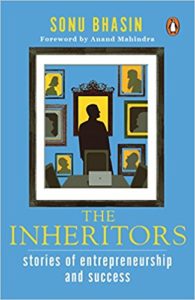
It is for these many reasons listed that reading stories about business families such as profiled by senior business management professional Sonu Bhasin in her book The Inheritors. She interviewed the younger generations of family run businesses that have flourished in India for generations. The case studies provide a fascinating insight into the interplay of the traditional and acute awareness of being global players as well as of changing economic scenarios and the urgent need to adapt. So accordingly changing tactics, grooming the younger generations, and preparing them to lead the businesses.
All said and done this pile of books is an interesting mix and plenty can be gleaned from it about how to steer one’s own business, however big or small. Although one can read and learn from other’s stories, ultimately a business grows exponentially based upon the choices made by the decision makers and for this many, many factors are taken on board — some apparent, some not so apparent.
Books discussed:
Gary Vaynerchuk Crushing It! How Great Entrepreneurs Build Their Business and Influence — and How You Can, Too Harper Business, an imprint of HarperCollins Publishers, New York, 2018. Pb. pp. 275
Elena Botelho and Kim Powell ( with Tahl Raz) The CEO Next Door: The 4 Behaviours that Transform Ordinary People into World Class Leaders Virgin Books, an imprint of Ebury Publishing, Penguin Random House, London, 2017. Pb. pp. 276
Alex Hutchinson (Foreword by Malcolm Gladwell) Endure: Mind, Body and the Curiously Elastic Limits of Human Performance Harper Collins Publishers, London, 2018. Pb. pp. 306
Hans Rosling ( with Ola Rosling and Anna Rosling Ronnlund) Factfulness: Ten Reasons We’re Wrong About the World – and Why Things Are Better Than You Think Sceptre, an imprint of Hodder & Stoughton, an Hachette UK company, 2018. Hb. pp. 346
Nassim Nicholas Taleb Skin in the Game: Hidden Asymmetries in Daily Life Allen Lane, Penguin Random House UK, London, 2018. Pb. pp. 280
Sonu Bhasin (Foreword by Anand Mahindra) The Inheritors: Stories of Entrepreneurship and Success Portfolio, Penguin Random House, 2017. Pb. pp. 304 Rs 299
27 June 2018







